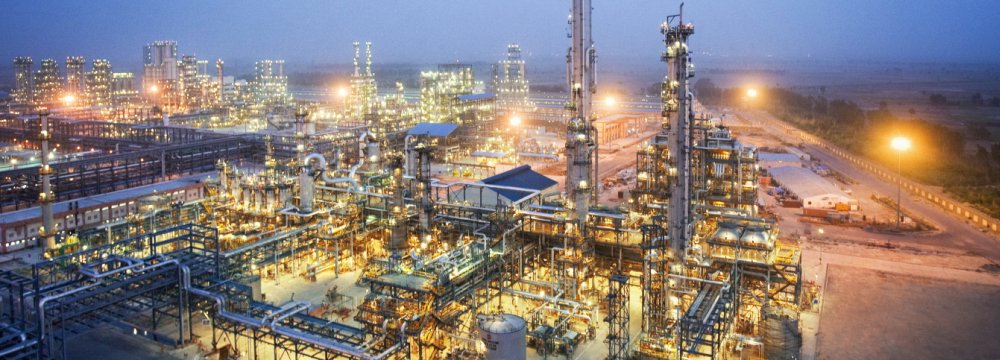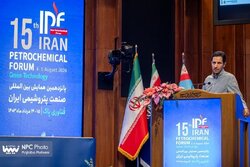
Majlis Support for New Petrochemical Investments

“Majlis is ready and willing to remove obstacles on the way of domestic and foreign investors to curb selling low value crude," Asadollah Qarekhani was also quoted as saying by NIPNA, the official portal of the National Petrochemical Company.
Pointing to the importance of collaboration between the government and the private sector, Qarekhani noted that the Majlis is all set to facilitate mutual cooperation.
According to the official, the basic approach of Majlis is to back domestic production and plans have been devised to reduce investment barriers in petrochemical ventures.
"Although existing laws suffice to support and protect domestic and international financers, more practical regulations will be ratified in the future," he said, adding that expanding the role of state-owned National Petrochemical Company is on the list of priorities of Majlis Energy Commission.
Attaching great importance to promoting foreign investment to boost petrochemical output, Qarekhani said following the implementation of the nuclear deal between Tehran and major powers in 2016, the ground for cooperation has encouraged many countries to play a role in Iranian projects. The official noted that foreign investors will not fund projects unless they notice a convergence of ideas and interests among executive bodies. He believes that petrochemical industry is a driver of economic growth. Moreover, completing the value-added production chain can and will generate higher revenues.
"Investment in the energy sector should be focused on the completion of value chain and development of petrochemical downstream industries, including refining and marketing of petroleum products and gaseous hydrocarbons, including ethane, propane, butane and pentanes," he said.
According to Qarekhani, empowering the petrochemical industry not only will create more jobs, but can also help Iran diversify its economy and reduce dependence on oil export revenues. Iran is pressing ahead with plans to reform its petrochemical industry, as the country aims to diversify its oil-based economy.
Tehran says its new petrochemical ventures require over $70 billion in investments that should mostly come from foreign sources.
Commercialized Gas Stations
According to Fereydoun Hassanvand, the head of Majlis Energy Commission, most commission members approved plans to commercialize gas stations, but the issue needs to be discussed in more details.
"The commission is preparing a comprehensive report on pros and cons of the proposal based on which gas stations will be operating under brand names in Iran for the first time," Hassanvand said, adding that the privatization of gas stations is aimed at improving the quality of services and customers' welfare, although some questions remain.
Reportedly, the proposal was made by the Oil Ministry and approved by the parliament. Municipal districts will provide land and facilities for the gas stations.
According to Alireza Sadeqabadi, managing director for the National Iranian Oil Refining and Distribution Company, joining the branding plan is totally optional and those who decide not to join the scheme will not jeopardize their trading profit.
"Eighty-six enterprises have registered their names in the branding scheme, of which 25 have started their activities in different provinces, namely Ardabil, Isfahan, Alborz, West Azarbaijan, Bushehr, Khuzestan, Fars, Lorestan and Mazandaran," he added.
Sadeqabadi noted that there will be no difference between branded gas stations and normal ones as both will receive the same kind of services from NIORDC.


Trump weighs using $2 billion in CHIPS Act funding for critical minerals

Codelco cuts 2025 copper forecast after El Teniente mine collapse

Electra converts debt, launches $30M raise to jumpstart stalled cobalt refinery

Barrick’s Reko Diq in line for $410M ADB backing

Abcourt readies Sleeping Giant mill to pour first gold since 2014

Nevada army depot to serve as base for first US strategic minerals stockpile

SQM boosts lithium supply plans as prices flick higher

Viridis unveils 200Mt initial reserve for Brazil rare earth project

Tailings could meet much of US critical mineral demand – study

Kyrgyzstan kicks off underground gold mining at Kumtor

Kyrgyzstan kicks off underground gold mining at Kumtor

KoBold Metals granted lithium exploration rights in Congo

Freeport Indonesia to wrap up Gresik plant repairs by early September

Energy Fuels soars on Vulcan Elements partnership

Northern Dynasty sticks to proposal in battle to lift Pebble mine veto

Giustra-backed mining firm teams up with informal miners in Colombia

Critical Metals signs agreement to supply rare earth to US government-funded facility

China extends rare earth controls to imported material

Galan Lithium proceeds with $13M financing for Argentina project

Kyrgyzstan kicks off underground gold mining at Kumtor

Freeport Indonesia to wrap up Gresik plant repairs by early September

Energy Fuels soars on Vulcan Elements partnership

Northern Dynasty sticks to proposal in battle to lift Pebble mine veto

Giustra-backed mining firm teams up with informal miners in Colombia

Critical Metals signs agreement to supply rare earth to US government-funded facility

China extends rare earth controls to imported material

Galan Lithium proceeds with $13M financing for Argentina project

Silver price touches $39 as market weighs rate cut outlook


















